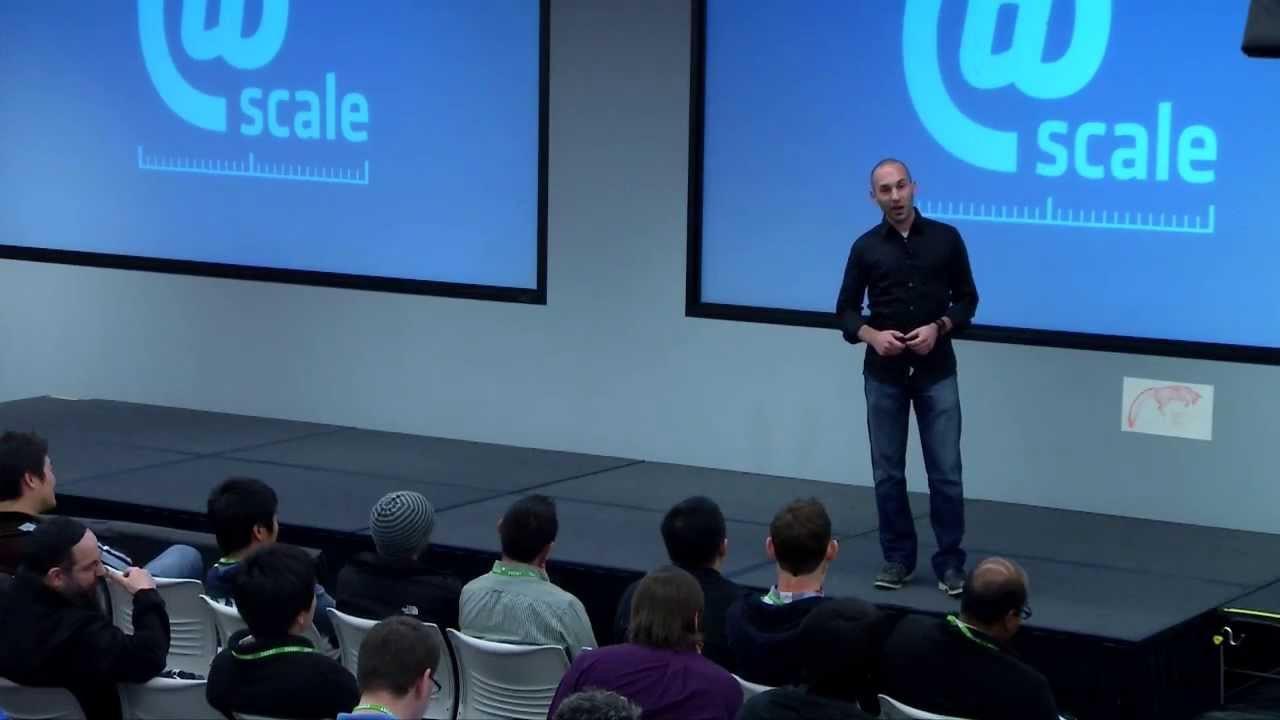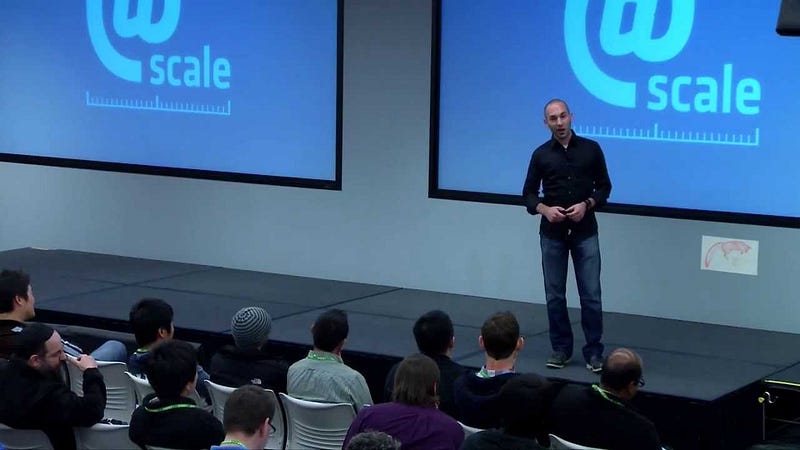
Engineering leadership | Blog Post
Hard-Earned Lessons from Apple, Facebook, and Rheo.
Linzi Nield
Share this post
If you ask the man who brought us the first-ever iOS app and many other innovative features at Apple and Facebook about the root of his success, Alan Cannistraro might take you back all the way to a series of childhood gifts from his father.
When Alan was just 6 years old, his father bought him an Apple 2. A year later he received a DX7 synthesizer. The following year a Nintendo. Individually, they were just big birthday presents, but together they help explain the foundation of Alan’s professional direction and passions. His enduring passion lies at the intersection of technology, media, and interaction. This unique combination is the fuel Alan used to lead the way at Apple on fan-favorite projects like Final Cut Pro and iBooks as well as to build a widely successful mobile engineering team at Facebook.
Most recently, Alan launched his own company — Rheo — which aims to revolutionize how we watch television. Alan is a longtime friend of Terminal and a big supporter of our vision to bring global opportunities to the world’s best talent. Alan calls our efforts timely and “awesome.”
To learn more about Alan before his Terminal Tech Talk next month, we jumped on the phone to get his take on engineering management, collaboration, and when to say “F the rules.”
Terminal: You’ve played multiple roles at some big name companies, and recently (3 years ago) you found yourself in the position of founder. How did your experience as an Engineering Manager affect how you manage and run your own company now?
Alan: Good question. My experience at Apple taught me to remove obstacles so that people could focus on what they liked and the work that fit their particular skill sets. In general, it was about figuring out how to keep your team focused and productive. Facebook was very different from Apple. At Facebook it was more about sharing information and finding ways to bring engineers into the decision making process and involve them in every step along the way. Both the Apple and Facebook methods proved to have very valuable side effects.
Personally, I believe that when you give an engineer a project that they are excited about, one that matches their skillset, and you create an environment where they can be focused and run uninterrupted, they will perform at their best. That’s the same philosophy I brought to Rheo. But the downside is that you sometimes have to take on the interruptions yourself along the way.
How do you view the relationship from the perspective of an ambitious young engineer who is a little lower on the ladder?
Well, I don’t want to contradict what I just said about the role of a manager, but it’s definitely a two-way street. The manager’s job is to get things off of other people’s plates so that those employees can get their work done. But at the same time I learned over the years that the best path to success was to make my managers’ job as easy as possible.
Great engineers go out of their way to take responsibility for and solve problems that are greater in scope than they are asked to take on. It’s incredibly valuable when an individual contributor can propose directions, best practices or decisions to their manager or fellow engineers. It makes the rest of the team’s job easier, which is a great accelerator to success. At Rheo, I look to my engineers for their recommendations, opinions, and ideas — and that helps guide me in my decisions. So it’s essential for a manager to have engineers who are thoughtful and who carefully consider what issues might be on the horizon.
Can you illustrate with a personal example from early in your career?
Sure. When I was at Apple I was handed a very important piece of advice — “You are only ever promoted to the job you are already doing!” For people who have big dreams of promotions and making a name for themselves, they should already be lending a hand to do the job that they want to be doing. You need to be conscious of stepping on people’s toes and being respectful, of course, managers seek to promote people that show initiative.
If you want to be driving product, then start driving product. You can’t wait for someone to ask you to step up; you need to just do it. When we were forming the media Apps team, it was pretty loose and someone had given me the advice to put myself in the mindset of “there is no manager, just go start!” So I started coordinating work amongst the team, scheduling tasks, proposing product direction, and communicating up the chain, and that’s when the accolades and the opportunities began to flow. I created the media apps manager job just by doing it, and was officially given the role just a few months later.
Early in your career, you went from being a senior engineer to a full-time prototype developer at Apple, which is a role that demands a lot of collaboration. Do you have any big takeaways from that experience?
Honestly, a lot of the success I’ve had has been because of collaboration, especially cross-team collaboration. Many great ideas took shape by getting managers and engineers from different teams to work together, and a lot of it through skunkworks efforts. That all happened through building friendships and positive relationships with the people and the greater community around me. I went out of my way to try to meet people outside of my own team.
When I was at Apple, which is a really big place to work, I had a rule to eat lunch twice a week with people that weren’t on my team. My best opportunities came from those relationships. Most of our great ideas started through impromptu, collaborative brainstorms. Apple, in particular, had a high level of secrecy — but at times we just had to respectfully say, “F the rules” and build those cross team relationships, and I’m glad we did. Many of those co-conspirators also grew into my closest friends today.
So F the rules then?
To be clear, I’m not saying that Apple suppresses creativity. They want to keep people focused and productive — but I do think that the big ideas and innovations that came when I was at Apple were sparked by people who went out of their way to connect with others.
Did you bring that collaborative mindset to Rheo?
Yeah, we hang out as much as possible. It’s a small team. It’s easy to collaborate, but the biggest key — no matter where you work — is that communication is the accelerator of working together. Engineers often get stuck in the process of working in isolation — it happens to all of us — but communicating, sharing, and talking through problems is the best way to create new solutions.
Has anyone asked you about your takeaways from teaching the CS course at Stanford? Over 15 million people attended online. That’s a lot of people.
Interesting question. What made the biggest impact on me was seeing the creativity that students drive when you give them autonomy and let their imaginations guide their work. During class lectures, you do your best as a teacher to set students up with specific concepts. But when it came to projects, my students had a lot of freedom. I was blown away at the variety of ideas and the level of creative thought and execution that formed when I gave people the space to work.
Thinking back, I realize that is where I have flourished and I try to bring that atmosphere back to my team at Rheo. We talk through problems instead of solutions. I let my team get to solutions that they believe in on their own before I step in as a manager and talk it through. If an employee can come up with a great solution on their own, they are much more likely to execute it without any setbacks than if you, as the manager, were to lay it out for them. I think I am lucky to see this all the time at Rheo.

People are fascinated by skunkworks teams. Is there a big difference on how those operate versus a regular engineer team?
Well…I think every skunkworks project is different. Some are experimental while others are formal. I’ve worked on projects where I am a worker bee contributing my small part to a super organized project. I’ve also been a part of projects that are wide open and experimental. I don’t think there’s a huge difference between how a skunkworks team and a regular engineering team is managed, but I think that providing engineers and designers freedom, which happens a lot on skunk works projects, is incredibly valuable.
The pride and the dedication that people have to projects that are under the radar — projects that strive to prove to someone that they have a good idea — tends to be…practically religious. It’s amazing how dedicated people are to those projects versus projects that are normally assigned to them. It’s a really powerful experience.
I know you graduated from the University of Waterloo. Here at Terminal, several of our members attended the same engineering program. What was it like back in the 90s and what do you think about it today?
I studied at UW from 1995–2000. At the time, it felt like it was very structured. We had a lot of required courses, but because we were all on the same track with the same classes, I think it really brought us close together. The camaraderie and the closeness of the relationships I built during the program were the most valuable things I took away from the experience. There are about 15 of us that I consider to this day to be my best friends. The education was fantastic, it was very hands-on, the labs were great, and the co-op program was fantastic.
But in retrospect, I look back and think about when we graduated in 2000 and only one of us started a company. Back then, startups were at an all-time high [before the bubble burst], but coming out of that class pretty much no one started a company. When I look at the students coming out now, there seems to be an entrepreneurial spirit that was missing back then. The accelerator programs and volume of startups that come out of UW now is incredible. I am blown away by the drive of people coming out of the program now to start their own companies and I think that’s a direct result of the UW choosing to focus on that. It’s really great to see and I’m impressed.
Can you leave us with something that you want to tell engineer and entrepreneurs? Something we didn’t ask but is important nonetheless?
You hear this a lot, but it’s really important that people work on things they are passionate about. We talk about work ethic and we talk about people working their asses off and achieving amazing things, but to do that there must be a love for what you are building. It’s critical that people not see their jobs as a job; they should view it as an important part of their life. We spend so much time working that it’s really hard to separate it and be good at it if we don’t love doing it every day.
A big thanks to Alan for the interview! Sign up to attend his KW Terminal Tech Talk here. To stay informed of future interviews and events, follow us on Twitter, Facebook, and LinkedIn.


